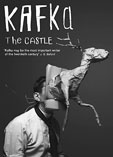"She held a trembling hand out to K. and made him sit down beside her... it was an effort to understand her but what she said" -- Last line of The Castle, by Franz Kafka
"It is the fate and perhaps the greatness of [Kafka's work] that it offers everything and confirms nothing" -- Albert Camus, The Myth of Sisyphus
Franz Kafka's novels were not published during his lifetime and his final book The Castle was never completed, ending in mid-sentence. When his novels were published after his death, fans and critics recognised that here was a sophisticated thinker who was much more than a writer of stories. There is something enigmatic about Kafka, which never quite reveals itself and which always suggests a double interpretation.
Kafka has been especially influential in the philosophical community among Post-Structuralist and Existentialist thinkers. Albert Camus in The Myth of Sisyphus dedicates a chapter to what he calls 'Hope and the Absurd in the Work of Franz Kafka' — for Camus, Kafka embodies the idea of 'Absurd Fiction' and it is through the lens of Absurd Fiction that I intend to investigate Kafka's two best-known novels, The Trial and The Castle.
What is the Absurd, and why should one write Absurd Fiction? Does Kafka conform to the image that Camus paints of him? Could The Castle have been finished or is there something poetic in its incompletion?
The presentation on Hope and the Absurd in the Work of Franz Kafka will be followed by a discussion of Kafka's work in general and of The Castle in particular, which people can read beforehand although this is not essential.
Synopsis of The Castle
"The Land Surveyor K. struggles to gain access to the mysterious authorities of a castle who govern the village for unknown reasons. Dark and at times surreal, the book recounts the seemingly endless frustrations of man’s attempts to stand against the system, and the futile and hopeless pursuit of an unobtainable goal."
www.amazon.co.uk/The-Castle-Penguin-Modern-Classics/dp/0141183446

